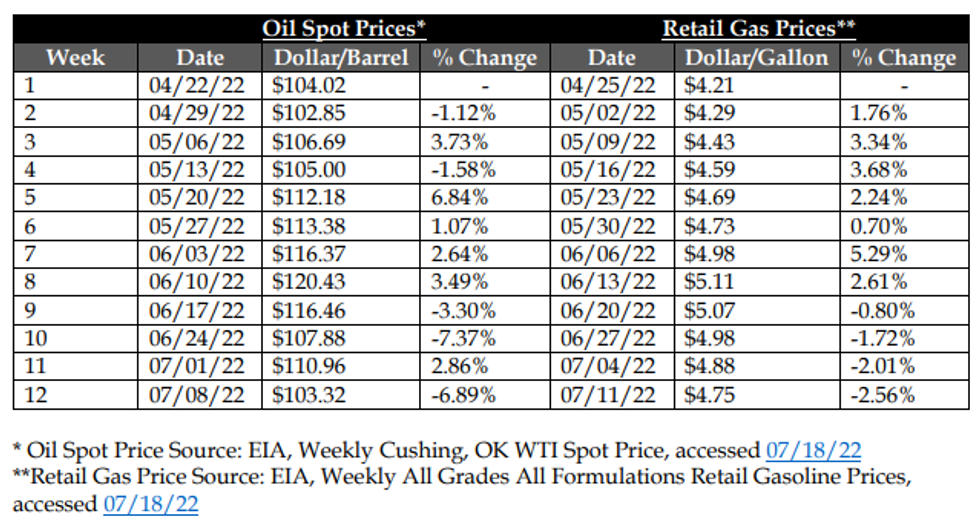Over the past four months, Big Oil has rushed to raise gasoline prices--sometimes charging far more at the pump than the increased cost of oil would warrant--and dawdled to lower them when crude's valuation declined, according to a new analysis released Monday by the progressive watchdog group Accountable.US.
"The longer Big Oil's predatory pricing scheme persists, the graver the cost to American consumers and the country's economic health."
Accountable.US acknowledges that the cost of oil plays an important role in determining the price of retail gas. But to understand why prices at the pump have outpaced the escalating cost of crude and why, when the cost of crude has fallen temporarily during the last 12 weeks, savings have very slowly--and only partially--been passed on to consumers, the group says look no further than fossil fuel corporations' desire to maximize profit margins.
"For months, oil and gas companies have price gouged consumers, squeezing record-breaking profits out of Americans and forcing many into dire financial straits," Jordan Schreiber, director of Energy and Environment at Accountable.US, said in a statement.
"When the price of crude oil increased, consumers were immediately forced to shoulder the high cost and more," said Schreiber. "Now, as crude oil prices fall, the industry needlessly drags its feet by lowering gas prices at a significantly slower rate than when they increased."
In its report, Accountable.US contrasted fluctuations in oil spot prices and retail gas prices.
When the cost of crude has risen, Big Oil has been quick to lift gas prices.
Sometimes, price hikes at the pump have closely resembled changes in the crude market. For instance, a 3.73% increase in oil spot prices from April 29 to May 6 was mirrored by a 3.34% increase in retail gas prices from May 2 to May 9.
In other cases, price hikes at the pump have exceeded climbing oil costs, such as when a 2.64% uptick in the price of crude from May 27 to June 3 was accompanied by a 5.29% increase in the price of gas from May 30 to June 6.
Meanwhile, when the cost of crude has fallen, Big Oil has been slow to act--if at all--and gas prices have either continued to soar or declined only slightly from one week to the next.
A 1.12% decrease in oil spot prices from April 22 to April 29 was accompanied by a 1.76% increase in retail gas prices from April 25 to May 2. An even more egregious example occurred when the cost of crude declined by 1.58% from May 6 to May 13 and the price of gas surged by 3.68% from May 9 to May 16.
Even when the industry has lowered retail gas prices, it has failed to do so at a rate commensurate with the falling cost of crude.
A 3.3% decline in oil spot prices from June 10 to June 17 yielded a 0.8% decrease in prices at the pump from June 13 to June 20. A week later, a 7.37% decrease in the cost of crude was accompanied by just a 1.72% drop in the price of gas. A 6.89% fall in the cost of oil from July 1 to July 8 was accompanied by a 2.56% decline in gas prices.
"Our analysis demonstrates that corporate greed drives artificially high prices at the pump," said Schreiber. "The longer Big Oil's predatory pricing scheme persists, the graver the cost to American consumers and the country's economic health."
In March, congressional Democrats led by Rep. Ro Khanna (Calif.) and Sen. Sheldon Whitehouse (R.I.) introduced the bicameral Big Oil Windfall Profits Tax.
According to polling data released soon after the legislation was unveiled, 80% of U.S. voters--including 73% of Republicans--support the measure, which would hit large fossil fuel companies with a per-barrel tax equal to 50% of the difference between the current price of a barrel of oil and the average price per barrel between 2015 and 2019. An estimated $45 billion in annual revenue would be redistributed to U.S. households in the form of quarterly rebates.
Dozens of progressive advocacy groups and lawmakers have been urging President Joe Biden, House Speaker Nancy Pelosi (D-Calif.), and Senate Majority Leader Chuck Schumer (D-N.Y.) to support the Big Oil Windfall Profits Tax, which Sen. Elizabeth Warren (D-Mass.) has said can help Democrats avoid "big losses" in November's crucial midterms.
But Khanna and Whitehouse's proposal faces long odds given the GOP's desire to capitalize on voters' mounting anger at the state of the economy. Not only is it unlikely that at least 10 Senate Republicans would support advancing debate on the bill, as required due to the filibuster, but it remains unclear whether right-wing Democratic Sen. Joe Manchin (W.Va.) would vote for it.


